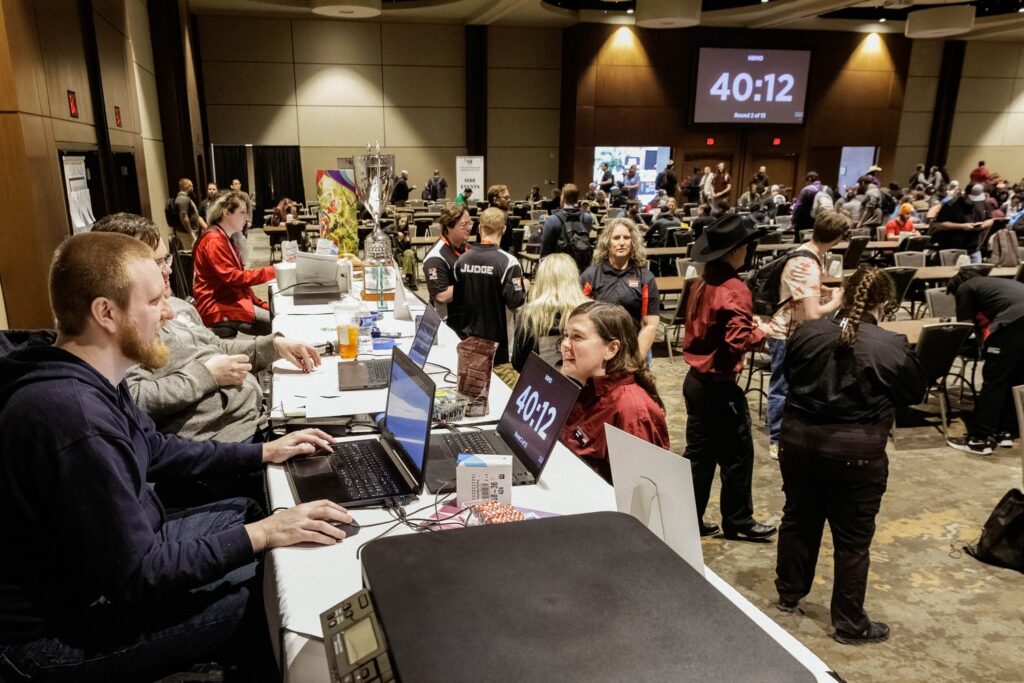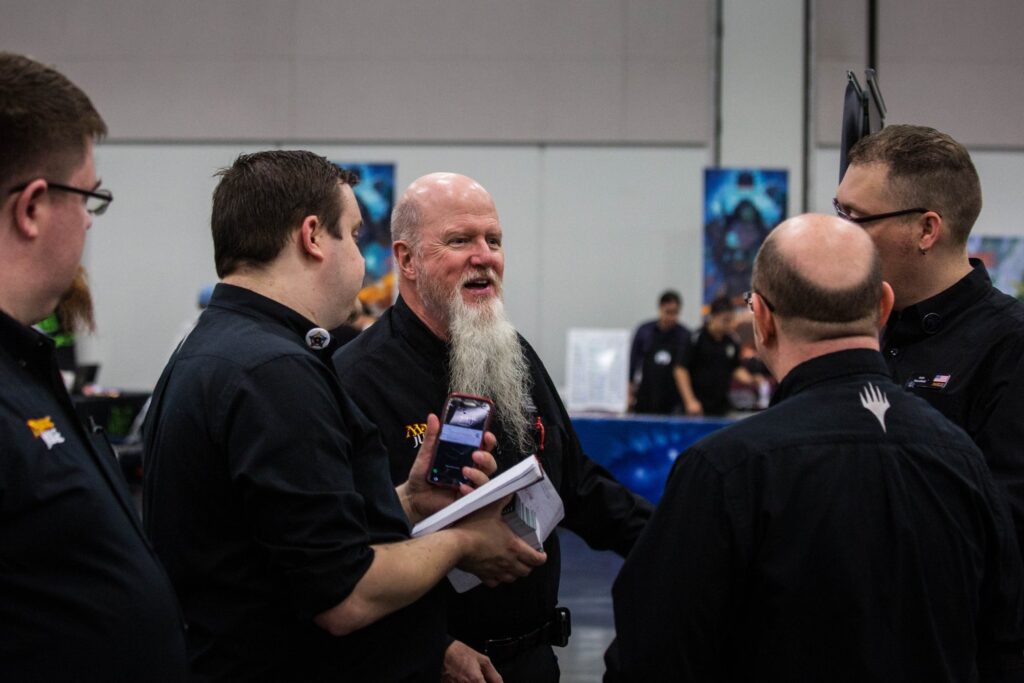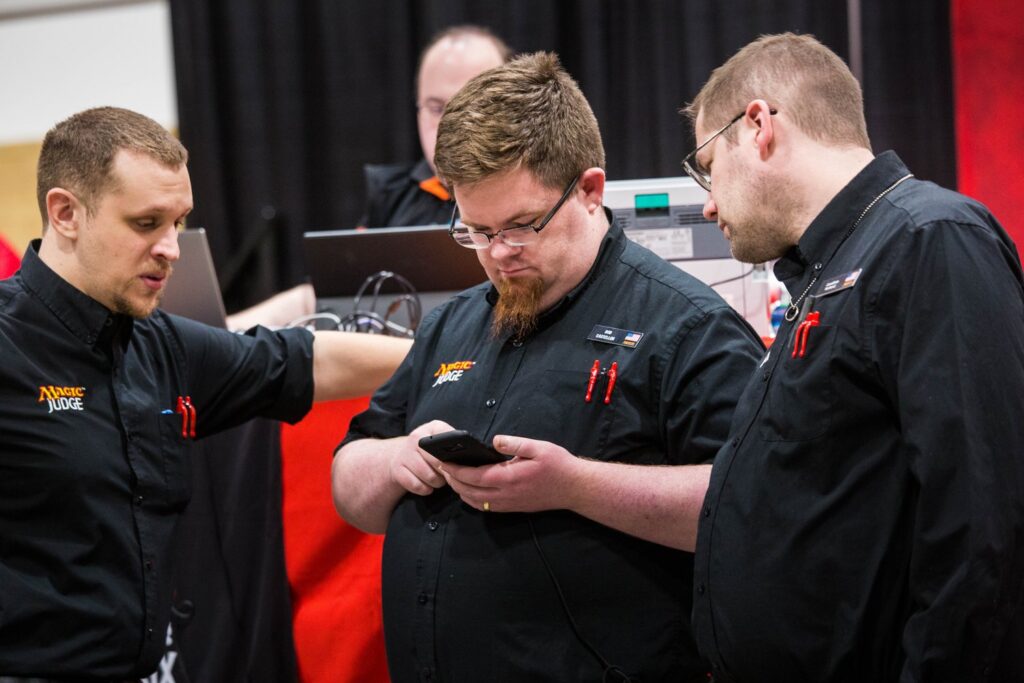One of the new features of Judge Foundry about which we’re most excited is that membership will vote for the leadership of the program. While there have been judge programs of various types for almost three decades, direct election of program leadership is something new that hasn’t been tried before.
This article is going to outline our plan for elections. In the process of doing so, it’ll also explain what the board actually does, who can run, and how we’ll count votes. There are still some elements that we haven’t locked in, and probably won’t lock in until ninety days before our first election in late Summer 2024, because we want to see how Judge Foundry’s launch plays out and hear your feedback, but this should at least give you some idea what we’re thinking.
As we mentioned above, more than on anything else we’ve posted to date, we want to hear your feedback. Please continue to share it on JudgeApps, Reddit, Facebook, Twitter or via email.

The Big Picture
Every September, Judge Foundry will hold our annual meeting. Think of a judge megaconference combined with a shareholder report. And while we’d love to see every Judge Foundry member at every annual meeting in person, we recognize that judges have many competing obligations and priorities, so judges will be able to participate from home as well. At the annual meeting, the board of directors will share with you a report on what Judge Foundry has accomplished over the previous year, an update on our membership and finances, and expectations for what the next year will bring. As a note, Judge Foundry’s year starts in October and ends in September, so “year” will refer to that throughout this article.
As a part of this meeting, members will vote on major, organizational-priority tier issues, and elect a new board of directors for the following year.
Voting is an exclusive privilege of Judge Foundry members. Every member who’s current in their dues and in good standing can vote in every election. While voting isn’t mandatory, we hope that every judge with an interest in the future of Judge Foundry will take the time to cast a ballot – Accountability is one of our core values, and this is your way to hold the program’s leadership accountable.

Board Members and Project Leads
Before we talk about how we’ll elect a board of directors, let’s talk a little about what the board of directors is, and how it differs from project leadership.
The board of directors sets the overall priorities for Judge Foundry. They’re elected to set a vision for the organization, to make decisions with the best interest of judges in mind, to negotiate partnerships with TOs and Publishers. The board handles the big picture. And like all nonprofit boards, Judge Foundry’s board of directors is bound by three fiduciary duties:
- The duty of loyalty – Directors are expected to act in Judge Foundry’s best interest, not their own. Directors can’t use their position as directors to benefit themselves – for example, it would be unethical for a director to write, in an application to an event “By the way, you should staff me because I’m on the Judge Foundry board.”
- The duty of care – Directors are obligated to, essentially, care about doing a good job as directors. This might seem obvious, but it’s important to note it as an expectation – if someone is too busy or not well-enough informed to make good decisions for the organization, they should probably step down or at least abstain from voting on issues where they can’t exercise this duty.
- The duty of obedience – Directors are expected to safeguard the mission of Judge Foundry, in order to preserve its nonprofit status, and to keep it focused on the mission with which our members entrusted us. This means sometimes saying no to ideas that are good or popular, but which aren’t in scope for us as an organization representing the business interests of tournament officials.
Taken as a whole, this means that, in pursuit of those big-picture objectives, the board sometimes has to make difficult or unpopular choices to protect Judge Foundry, so that we can ensure judges’ dues are being spent wisely and so that Judge Foundry will still be there for future judges. Notably, board members are not (and we don’t think they ever should be) paid to be members of the board.
The board meets formally at least once a quarter, to vote on issues and hear from membership. It’s our plan to stream these meetings so that members can see our deliberations and offer feedback. We may also have ad-hoc meetings if something vital comes up – this will probably happen a little more often in the first year than it will in the future.
While the board is looking at the big picture, project leaders and their teams are focused on small day-to-day slices of the program’s operation. You might remember projects from judge programs past, and you won’t be surprised to learn that they’re going to work very similarly.
Some projects are designated as Core Projects – think things like test content, website/technology, marketing, and inter-program relations. These projects are so vital to Judge Foundry’s operations that they need to have leaders on whom the community can rely. And because they’re essential, the board will select leaders that have the skills to do the job well, the trust to follow the board’s vision, and the experience to know what’s worked and not worked in the past.
There are a few projects – things like exam content and advancement checklists – which are central to Judge Foundry’s goals, and which are subject to the Board’s direction for strategic or legal reasons. The vast majority of projects, however, are simply groups of judges working towards a common goal, and are self-governed. A new board will not necessarily mean new project leadership, except for those projects which are central to Judge Foundry’s operations, and it’s our intent to evaluate how these projects are advancing the organization’s mission and to generally keep in place leadership that’s working effectively toward that end.
Outside of these few core projects, other projects are fair game – after we’ve launched and you’ve become a member, if you have an idea of a project to make judging better, and it advances the core values of Judge Foundry, find some like-minded judges and submit a proposal! We’re going to ask that, at least in the month or two following Judge Foundry’s launch, judges have respect for their peers who previously spearheaded projects, and let them have “first dibs” on bringing the band back together or appointing a successor. We want to recognize how important these project leads were to the past judge program and to welcome them home if they’re willing to pick up where they left off.
Project leaders and project members can be judges of any level, in most cases. However, there will be exceptions to this rule. For example, you can’t have a Level One Judge in charge of testing for Level Two Judges. A less obvious example is that some projects may handle sensitive information, and project leaders may restrict membership to judges who’ve already been certified as having the Personal Skills necessary to reach Level Three to participate.
We’ll talk a little more about projects, and how you can get involved, in an upcoming post.
Proportional Ranked Choice Voting
We’ve selected proportional ranked choice voting (RCV) as our election system of choice. This system lets nearly every voter’s vote count, it guarantees a diverse board that represents the interests of the members, and it reduces the “gamification” of voting.
Using proportional RCV, each member will rank as many candidates as you want, marking the candidates first pick, second, etc. All board seats are up at the same time and are equal, so you don’t need to pick and choose whom you want for each seat. Once voting closes, the ballots will be counted and any candidate who has at least the minimum threshold (just under 17% with five seats) of first-pick votes, will be elected. If that doesn’t fill all five seats (spoiler: it probably won’t), winning candidates’ excess votes are redistributed to those voters’ second-picks. At that point, we check again for threshold and repeat this process until all seats are filled, or until no one is above the threshold number. If this happens, the candidate with the fewest votes is eliminated from contention, and their votes are redistributed. The process continues until we have all five seats filled.
Here’s an explainer you can read if you’d like to learn more, but be sure to come back here after reading because there’s lots more to discuss.
Using proportional RCV, a candidate only needs just about 17% of the vote to win a seat as long as the board of directors has five Community Member seats. This ensures that many groups can have their interests reflected on the board – whether you’re making your first pick based on supporting someone with the best plan for judge testing, someone you feel is a fresh voice in the program, someone from your region or any other criterion, if enough other members feel the same way, the candidate you’re supporting will win a seat. The lower threshold-to-elect for each seat means a more diverse final board of directors than any single-member system would provide.
Want to learn more? Here are some more resources on how proportional RCV works:
- More information from Fairvote.org
- Ranked Choice Voting Resource Center Handout (pdf)
- The Wikipedia article on proportional RCV

Eligibility to run for director
Judge Foundry has a level system that, in addition to evaluating skills like rules knowledge and ability to understand tournament logistics, tests candidates’ personal and leadership skills. While we always say that level is a quality floor and not a ceiling (that is, an L1 could have the leadership skills we expect in an L5), level also has correlations to other valuable skills for a director, like tenure judging, relationships with TOs, publishers and other judges, experience and overview.
That’s why we set a minimum level for judges to serve as directors: Judges must be at least Level Three to be elected to a seat on the board of directors. To be clear, this doesn’t mean that we don’t believe that there is a Level Two Judge out there who could be an outstanding director. Instead, it means that we believe that any eligible director should also be qualified for Level Three, and achieving Level Three demonstrates that a judge has sufficient understanding of Judge Foundry and the organized play ecosystem, and has demonstrated the leadership and personal skills necessary to be considered by the community for a leadership role.
If you want to serve as a director in Judge Foundry, and aren’t a Level Three Judge, we hope that this will be a motivator for you to work toward advancement. Study that policy, work those events, get that recommendation – the process of working to advance will make you an even more suitable candidate for the board once you’re there. If you’re a good candidate for director, you’re probably also a good candidate for Level Three, and we hope this is a tiny push to get you over the line to decide to level up.
In addition to being an incentive to level up, and a bar of quality, limiting candidates to Level Three or higher clears the field to a manageable number of candidates. We recognize that we’re asking voters to do a bit of homework in reading up on the platforms of candidates and to select the ones whom they believe will best exemplify your values, and we don’t want to create an unmanageably large field of candidates.
Voting at the Annual Meeting
A couple months out from the annual meeting, we’ll post a call for candidates. Candidates will submit their application (essentially a very simple checklist that says “I’m an L3+” and “I’m current on my dues”). A month out from the annual meeting, we’ll post the list of candidates, and they can share their visions for Judge Foundry and their qualifications for office.
Judges can endorse one or more candidates – we expect a number of veteran judges will choose to do so, but anyone can write an endorsement post. We’ll also host a candidate forum where judges can ask questions of board candidates – it’s especially important if someone runs on a platform that’s unfeasible or ill-considered for other judges to be able to ask how they’re planning to make that work. We don’t want to see judges attacking one another personally during this process – remember that the selected board will probably be a diverse slice of the judge program. But it is important for judges to carefully examine their options before casting their vote.
On Saturday at the annual meeting, we’ll have time for a quick “closing argument” from each candidate, then voting will be open. For the next four hours, judges (both at home and at the meeting) can cast their votes. (If you have a job or other responsibility that would make it absolutely impossible to vote in this window, we’ll have a way to apply to cast your vote early.) After the window closes, we’ll tally up all the votes, run them through the algorithm, and on Sunday, announce Judge Foundry’s new board of directors!

Conclusion
There’s a lot more that can be said about elections, and that will be said early summer as we get closer to our first annual meeting. But we wanted to lay out our plan now, so judges can provide feedback and discuss it with each other.
As we always say (and we really do mean), we want your feedback. We think these rules provide the best balance of empowering judges to select our leaders, providing a way for minority viewpoints to be represented, hewing to our value of accountability, and protecting the organization. But because this is the first time Judges have tried something like this, we do expect that these rules will need tweaking, perhaps more than any other structure that we’re creating. You can post on this article’s thread on JudgeApps or on Reddit, you can comment on our posts on Facebook or Twitter, or you can always email us.
Enjoy your weekend (especially if you’re judging!) and we’ll catch up to you next week to talk about volunteering, dues and Level Four.
